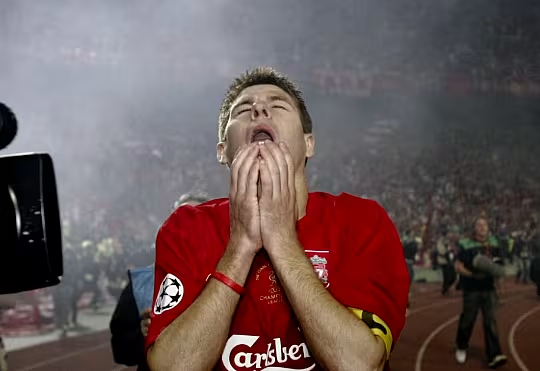Steven Gerrard is responsible for one bad book and another that could have been good had it not been rushed and written in 15 weeks, so the most thoughtful look-back at his Liverpool career is a new documentary showing on Amazon Prime called Make Us Dream.
It traces Gerrard's career from the Liverpool youth team to his return as the under-18s coach and interrogates the question: why did he stay?
The documentary dwells on his biggest moments on and off the field at Liverpool, most of which involved Chelsea, the club that drew the plans for what could have been Gerrard's other life.
He twice almost left for Chelsea, the second weeks after declaring in Istanbul, 'How could I leave after a night like this?'
The reason he stayed?
He would never be loved in London like he was in Liverpool, by those he frequently calls "my own people". In making this decision, Gerrard seems to have forgone any further pragmatic career decisions and accepted this kind of intractable vocation; the glum, forehead-creased figurehead of Liverpool who would have to meet with Luis Suarez and Stewart Downing and treat them both the same.
'Arise, Stevie la'.
"Nine out of 10 people might argue I would have made more money, won more trophies, blah, blah. But them people are not me. They’re not in my city and they don’t have that connection with my club. That’s why I’m the one in 10", rationalises Gerrard.
The documentary establishes a link between Gerrard and "his people": shots of him at pitch-level then often zoom and linger upon the crowd, as he is established as the determined, sinewy embodiment of all of the desires that rolled from the stands.
But consider the title - it's a demand, and one hell of one at that. 'Hey Stevie, no biggie, but can you help us escape the yolk of Alex Ferguson and the drudgery of our daily lives and just, y'know, make us dream? Cheers'.
What emerges from the documentary is how....dour and miserable Gerrard is throughout. He says he would have it no other way, but he wore himself down.
You feel the responsibility for all of those people. 'It's your fault', you tell yourself. You feel alone. The highs are going to be the best days of my life...the lows are going to be the worst.
Or consider these words from his agent Struan Marshall when it looked like Gerrard was going to Chelsea in 2005.
It brought to life how people feel about the football club, and people made it clear what they felt. Notes posted at the end of the road, phone calls, text messages: 'You're not going. Fuck off, you're one of ours. You better not fucking go. Direct threats, mate.
I've been around him in Liverpool enough to realise what a bizarre hotbed of pressure it is to be him in that city. I wouldn't change places with him. He's held the Champions League trophy above his head. I'd love to do that. But I wouldn't change places with him. That's what I've thought when I've watched his shirt being burnt on a television screen.
Gerrard's awareness of the importance of being Liverpool captain is enervating to the point of being oppressive and is largely motivated by a fear of not delivering, of not being good enough to live up to predecessors like Souness or Emlyn Hughes. "Liverpool captains always deliver", he says with the idealism that makes a man forget Mark Wright.
Gerrard approaches the Istanbul final by saying "let's not fuck it up", and ends it not in ecstasy or bliss but in a state of exhausted relief. "This weight of responsibility and pressure that lifted off me was frightening….frightening. I don’t think anyone on this planet has ever felt like I felt when that happened".
The camera then lingers on a photograph of a drained Gerrard with eyes closed, mouth open, looking at the sky as if Jerzy Dudek had just orchestrated an exorcism.

"This was pure. It felt like a victory for spirit", says contributor John Williams, "and Steven Gerrard was the central character. That's why he meant to much to us".
As Gerrard's career ticked to a close, it looked like he had found a central role in another moral tale, as Liverpool pushed for the league title, the elusive symbol whose absence mocked Gerrard and "his people". Chelsea, of course, would be the side against whom he and Liverpool would make the final push....and it went according to a narrative. Just not the right one.
A fortnight after a tearful Gerrard roared at his teammates that "this does not fucking slip", he.....fucking slipped. They blew a three-goal lead at Crystal Palace eight days later, and Gerrard finished his Liverpool career with a 6-1 defeat at Stoke City.
"It was only fair to come out of that pressure situation for my family. Over here has allowed me a chance to breathe, to finish my career with a smile on my face", Gerrard says from LA.
The film tells the Gerrard Story well, and overall it is a morality tale of a kind. If the cold end to Gerrard's Liverpool career proves that there are no corporeal fairytales, it also proves the folly of demanding one.
Elite football is so drenched in commercialism, heartlessness, and spurious motives that a player like Gerrard dedicating his career to his boyhood club out of something like love should be a Good Thing, but the game is so ruthless and demanding that it can never live up to expectations.
What should have been Gerrard's perfect farewell against Chelsea in 2014 perished not because of an unfortunate slip but because of the responsibility he felt he had to burden. It simply meant too much. His grave error in that game was not his falling over, but his response to his misfortune. He charged around in the second half shooting pointlessly from long-range in an artless, hopeless toil for heroism.
Gerrard had so deified his predecessors and felt so keenly his responsibilites that he set himself a standard that not even a man of his considerable talents could live up to, and yet he was haunted by his possibly not reaching them. Given this was his reality, it is no surprise he looked for validation elsewhere, and that the suave embrace of Jose Mourinho would do more for him than Rafa Benitez, who always gave the impression of being baffled that love could possibly have these depths.
The deep irony of Gerrard's career is he needed Benitez' dispassionate ways more than anyone.
He was at his best when he slotted into Benitez' systems: playing not in midfield but behind Fernando Torres or off the right wing. His most important contribution in Istanbul was his goal, but the next was his agreeing to play as a right-back in extra-time to blunt the danger of Milan substitute Serginho.
After the slip, Gerrard needed the cold intrusion of Benitez. Brendan Rodgers did not have the confidence or authority to substitute Gerrard to put a necessary end to his doomed endeavour; perhaps Benitez would have.
Ultimately, it all meant too much to him. While romantic ideals about football and sport dictate otherwise, those best suited to responding to demands for dreams are those whose deepest ambitions differ. At the end of it all, theirs' is a professional business; the myth-making is someone else's job.
In a perceptive review of Get Out, Zadie Smith wrote that director Jordan Peele identified "the ultimate unspoken fear: that to be oppressed is not so much to be hated as obscenely loved".
In his quieter moments, perhaps Steven Gerrard would agree.
Make Us Dream is the subject on this week's edition of The Reducer Podcast. You can listen to a fuller discussion of this documentary on the podcast by subscribing on iTunes or wherever you get your podcasts. Alternatively, you can listen below.












